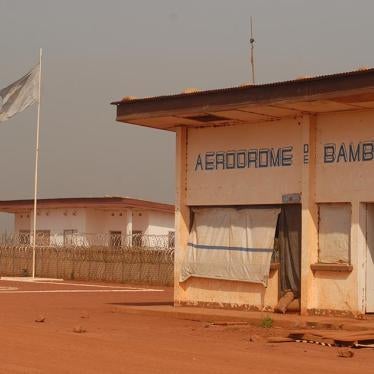Despite their mandate to maintain peace and protect people in war-torn countries, some UN peacekeepers have themselves been abusers. Highly publicized allegations of sexual exploitation and abuse by peacekeepers in the Central African Republic have brought new attention to longtime concerns over peacekeepers violating the rights of those they are meant to protect.
Now, the first-ever UN resolution on sexual exploitation and abuse by peacekeepers offers an additional tool to hold abusive peacekeepers to account, as well as hope that survivors of such abuse will receive the support they need.
On March 11, the UN Security Council adopted its resolution on sexual abuse and exploitation, designed to prevent sexual violence by UN peacekeepers. In addition to language on holding alleged perpetrators accountable, resolution 2272 also calls for medical and psychological assistance for survivors of sexual violence. In the days leading up to the negotiations, Human Rights Watch pushed to ensure the resolution called for comprehensive support for sexual violence survivors and urged the UN to prioritize their security and well-being.
Despite the UN’s decade-old “zero tolerance” policy on abuse by peacekeepers, Human Rights Watch recently documented cases of sexual exploitation and abuse by UN peacekeepers in the Central African Republic. We found that limited resources and the absence of a clear, coordinated response among UN agencies led to delays not in only reporting abuse, but also in ensuring that survivors access critical services. The lack of support to survivors was also highlighted in a 2015 report from the Office of Internal Oversight Services, the UN’s internal watchdog, which found that very few victims of sexual exploitation and abuse “have been assisted due to lack of dedicated funding and the slow enforcement process.”
As UN Security Council members began negotiations on a new resolution, Human Rights Watch urged that perpetrators be brought to justice and victims be supported. We provided analysis of the new Secretary-General’s report on peacekeeper abuse, as well as concrete recommendations to ensure that UN agencies put survivors first in their response, namely by maintaining confidentiality, minimizing the risk of repeated trauma from multiple interviews, and ensuring prompt access to medical and psychosocial care – all missing from previous policies.
The final resolution adopted by the UN Security Council included our recommendations for survivors almost verbatim, thus providing an additional accountability avenue for survivors and those who advocate for their rights.
There is much left to be done to prevent and respond to sexual exploitation and abuse by peacekeepers and other UN personnel. Ensuring survivors receive the protection and services they deserve is essential, and the inclusion of support to survivors in resolution 2272 is a step in the right direction.










